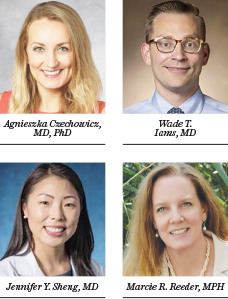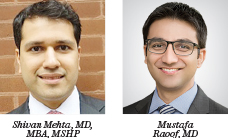The National Comprehensive Cancer Network® (NCCN®) and the NCCN Foundation announced five new recipients for the 10th annual NCCN Foundation Young Investigator Awards Program. The honorees will receive up to $150,000 in funding to study ways to improve care and help find cures for people with breast, colorectal, pancreatic, and small cell lung cancers, as well as pediatric acute myeloid leukemia. The NCCN Oncology Research Program managed the selection process and will oversee the projects, which will each extend for the next 2 years.

Award Recipients
The 2020 NCCN Foundation Young Investigator Award recipients are:
Agnieszka Czechowicz, MD, PhD, Assistant Professor of Pediatrics, Stanford University School of Medicine: “Development of Anti-hKIT Chimeric Antigen Receptor T Cells as a Dual Hematopoietic Stem Cell Transplantation Conditioning and Immunotherapeutic Agent for Cure of Pediatric Acute Myeloid Leukemia”
Wade T. Iams, MD, Assistant Professor of Medicine, Vanderbilt University Medical Center: “Quantifying Minimal Residual Disease in Patients With Small Cell Lung Cancer”
Shivan Mehta, MD, MBA, MSHP, Assistant Professor of Medicine, University of Pennsylvania: “Choice Architecture and Mailed Colorectal Cancer Screening Outreach in a Community Health Setting”
Mustafa Raoof, MD, Assistant Clinical Professor, City of Hope Beckman Research Institute: “Targeting Transcription-Replication Conflicts in KRAS-Driven Pancreatic Cancer”

Jennifer Y. Sheng, MD, Assistant Professor in Oncology, Johns Hopkins University School of Medicine: “An Adaptive Nutrition and Exercise Weight Loss Study for Breast Cancer Survivors.”
“The NCCN Foundation is proud to honor these talented researchers as they explore the course of treatment innovation and advancement for people with cancer,” said Marcie R. Reeder, MPH, Executive Director, NCCN Foundation. “We look forward to seeing where their research takes them on the path toward future breakthroughs.”

